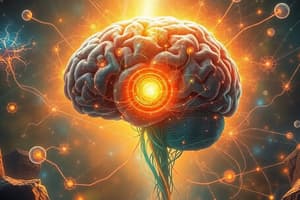Podcast
Questions and Answers
Which brain region is primarily involved in the formation of new memories about experienced events?
Which brain region is primarily involved in the formation of new memories about experienced events?
- Cerebellum
- Cerebral cortex
- Amygdala
- Hippocampus (correct)
What is the process by which a temporary memory is transformed into a long-lasting form?
What is the process by which a temporary memory is transformed into a long-lasting form?
- Memory retrieval
- Memory modulation
- Memory consolidation (correct)
- Memory formation
What type of memory is associated with skills requiring coordination and fine motor control?
What type of memory is associated with skills requiring coordination and fine motor control?
- Semantic memory
- Procedural memory (correct)
- Episodic memory
- Declarative memory
Which brain area is thought to be distributed in neural networks throughout the brain?
Which brain area is thought to be distributed in neural networks throughout the brain?
What is the term for the strength with which a memory is consolidated?
What is the term for the strength with which a memory is consolidated?
Which brain region is involved in the learning of routine skills?
Which brain region is involved in the learning of routine skills?
What is the primary function of sensory memory?
What is the primary function of sensory memory?
Which type of sensory memory is responsible for processing odors?
Which type of sensory memory is responsible for processing odors?
What is the primary brain region involved in supporting short-term memory?
What is the primary brain region involved in supporting short-term memory?
How long does information typically persist in iconic memory?
How long does information typically persist in iconic memory?
What is the primary difference between short-term and long-term memory?
What is the primary difference between short-term and long-term memory?
What is the result of the process of long-term memory formation?
What is the result of the process of long-term memory formation?
Flashcards are hidden until you start studying
Study Notes
Memory Consolidation
- The hippocampus, amygdala, and cerebellum play crucial roles in the consolidation and manipulation of memory.
- The hippocampus is essential for forming new memories about experienced events and declarative memory.
- The amygdala is involved in memory consolidation, modulating the strength of memory consolidation.
- The cerebellum plays a role in the learning of procedural memory and motor learning.
Memory Process
- The physical location of memory remains relatively unknown, but it is thought to be distributed in neural networks throughout the brain.
- Certain areas of the brain are specialized for collecting, processing, and encoding specific types of memories.
- Activity in different lobes of the cerebral cortex has been linked to the formation of memories.
Modal Model of Memory
- The three major classifications of memory are sensory memory, short-term memory, and long-term memory.
- Sensory memory is a mental representation of how environmental events look, sound, feel, smell, and taste.
- The temporal and occipital lobes are associated with sensation and are involved in sensory memory.
- Sensory memory has three types: echoic memory (ultra-short-term memory for sounds), iconic memory (immediate, brief memory of visual images), and haptic memory (information collected by tactile sense).
- Olfactory memory processes odors, and gustatory memory processes taste.
Short-Term Memory
- Short-term memory is involved in remembering pieces of information for a short period of time (up to 30 seconds).
- It is supported by brief patterns of neural communication dependent on regions of the prefrontal cortex, frontal lobe, and parietal lobe.
Long-Term Memory
- Long-term memory takes information from short-term memory and creates a long-lasting memory.
- These memories can be from an hour ago or several decades ago.
- Long-term memory is maintained by stable and permanent changes in neural connections spread throughout the brain.
Studying That Suits You
Use AI to generate personalized quizzes and flashcards to suit your learning preferences.




